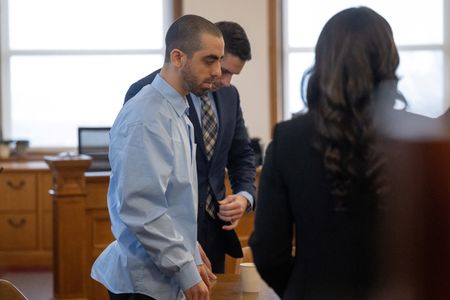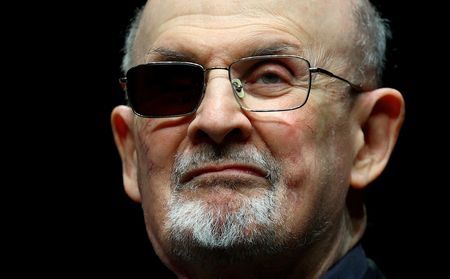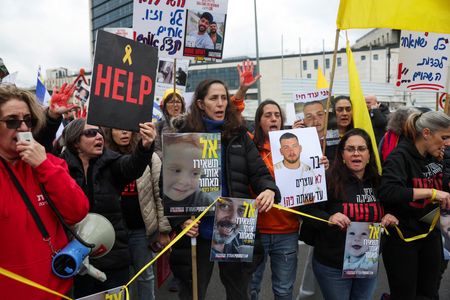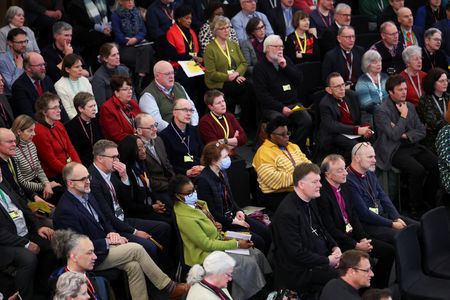By Jonathan Allen
MAYVILLE, New York (Reuters) -Salman Rushdie spoke calmly and with occasional dry humor as he testified on Tuesday against the man accused of trying to murder him, the first time the two have been in the same place since the 2022 knife attack on the novelist onstage at a New York arts institute.
Hadi Matar, 26, has pleaded not guilty to charges of second-degree attempted murder and second-degree assault.
Rushdie, 77, walked into the courtroom dressed in a dark suit, white shirt and gray tie. Two sheriff’s deputies stood at alert by Matar, seated at a table with his team of public defenders. The right lens of Rushdie’s spectacles was blacked out, masking the eye, which his attacker’s knife had pierced through to the optic nerve.
“I was aware of this person rushing at me from my right hand side,” Rushdie testified in a courtroom in Mayville, a few miles north of the Chautauqua Institution, the lakeside rural arts haven where he was attacked on August 12, 2022.
The controversial writer, for decades the target of death threats, had been seated onstage at the institution’s outdoor amphitheater that morning, about to give a talk on keeping writers safe from harm.
“He hit me very hard,” Rushdie said. “Initially, I thought he had punched me. I thought he was hitting me with his fist. But very soon afterwards I saw really quite a very large quantity of blood pouring out onto my clothes, and by that time he was hitting me repeatedly. Stabbing, slashing.”
Rushdie’s wife, the poet Rachel Eliza Griffiths, sat in the public gallery, becoming tearful as Rushdie described falling bloodied to the floor. She was next to the writer Bill Buford, a friend of Rushdie’s, who took Griffiths’ hand to comfort her.
Matar, dressed in a baggy blue shirt, sometimes looked at Rushdie, and filled the page of a yellow legal pad with dark ink. In his memoir about the attack, Rushdie wrote that he was looking forward to facing him in a courtroom.
Soon after the attack, Matar, a U.S.-Lebanese dual citizen from New Jersey, told the “New York Post” in a jailhouse interview that he disliked Rushdie because he believed the writer had insulted Islam, and said he was surprised that Rushdie survived.
His defense lawyers have not disputed that Matar was in the amphitheater that day but have told the jury that the prosecutor’s evidence will not prove beyond a reasonable doubt that Matar had the necessary criminal intent to be charged with murder.
Born in India into a Muslim Kashmiri family, Rushdie spent most of the 1990s in hiding in the UK after receiving death threats over his 1988 novel “The Satanic Verses.”
The novel prompted Ayatollah Ruhollah Khomeini, then Iran’s supreme leader, to issue a fatwa calling on Muslims to kill Rushdie for what he said was blasphemy against Islam.
The jury has not heard about the fatwa or the threats against Rushdie’s life, with the Chautauqua prosecutor’s office saying they are not relevant to proving the charges against Matar.
Rushdie abandoned his reclusive existence more than two decades ago, moving to New York City.
Onstage at the Institution, Rushdie was stabbed about 15 times: in the head, neck, torso and left hand, blinding his right eye and damaging his liver and intestines, nearly killing him, according to his surgeons.
Rushdie said the stabbing in his right eye, which almost penetrated his brain, was the most dangerous.
“You can see that’s what’s left of it,” Rushdie said, removing his spectacles and turning to the jury. “There’s no vision in the eye at all.” He also pointed out scars on his neck and left hand.
The assault charge is for the wounding of Henry Reese, the co-founder of Pittsburgh’s City of Asylum, a non-profit group that helps exiled writers, who was conducting the talk with Rushdie that morning.
Rushdie described his attacker as dressed in dark clothes with a dark face mask.
“I was very struck by his eyes which were dark and seemed very ferocious to me,” Rushdie testified.
A defense lawyer for Matar objected to the characterization, and Judge David Foley struck the answer from the record.
“Okay, not ferocious,” Rushdie said.
Chautauqua District Attorney Jason Schmidt rephrased his question, asking the writer how he came to make conclusions about his attacker’s ferocity.
“He struck me a number of times, another half a dozen times,” Rushdie replied. “At some point I thought I was dying. That was my immediate thought.”
If convicted of attempted murder, Matar faces a maximum sentence of 25 years in prison. He also faces separate federal terrorism charges at a trial in Buffalo.
Lynn Schaffer, one of Matar’s defense lawyers, asked Rushdie in her cross examination about how he was able to testify that he was stabbed 15 times.
“I wasn’t counting at the time,” Rushdie said. “As I said, I was otherwise occupied. But afterwards I could see them on my body. I didn’t need to be told by anybody.”
Schaffer asked him about his work as a writer and his occasional cameos in movies, noting that “Bridget Jones’ Diary” was one of her favorites.
“My most important work,” Rushdie replied, a few minutes before he stepped down from the stand and walked near Matar’s table to leave the courtroom.
(Reporting by Jonathan Allen in Mayville; Editing by Donna Bryson and Mark Porter)









